December 4, 2012
Edited by David Sanders
Specimen Days
December 4, 2012
1123 – Omar Khayyám, Persian poet, astronomer, mathematician, and philosopher (b. 1048), dies.
1555 – Heinrich Meibom, German historian and poet (d. 1625), is born.
1609 – Alexander Hume, Scottish poet, is born.
1649 – William Drummond of Hawthornden, Scottish poet (b. 1585), dies.
1732 – John Gay, English poet (Beggar’s Opera), dies at 47.
1800 – Emil Aarestrup, Danish physician/poet (Ritornellen), is born.
1875 – Rainer Maria Rilke, Austria, poet (Duino Elegies), is born.
1876 – Dimitur Poljanov, [Popov], Bulgaria, poet (Iron Poems), is born.
1933 – Stefan George, German poet (Das neue Reich), dies at 65.
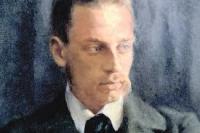 Blank Joy
Blank Joy
She who did not come, wasn’t she determined
nonetheless to organize and decorate my heart?
If we had to exist to become the one we love,
what would the heart have to create?
Lovely joy left blank, perhaps you are
the center of all my labors and my loves.
If I’ve wept for you so much, it’s because
I preferred you among so many outlined joys.
—Rainer Maria Rilke, 1875–1926
Poetry In The News
No God Allowed in Girl’s Poem in McDowell County, North Carolina

On Thursday, it became viral that a six-year-old girl at West Marion Elementary School in Marion, North Carolina was told to remove the word “God” from a poem that she was scheduled to read at a Veteran’s Day ceremony earlier this month. The young girl’s poem was written to honor both of her grandfathers who had served in the Vietnam War some forty years ago. In the poem, there are the lines: He prayed to God for peace / He prayed to God for strength. Read more at the Examiner.
Poet Laureate Rails at Women Bishops Vote
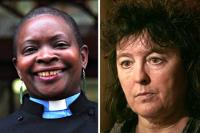
Is there to be schism between the Church of England and the Poet Laureate? Carol Ann Duffy was giving a recital at Southwark Cathedral last night, just hours after the bid to allow women to be bishops fell at the final hurdle, and she made her displeasure felt. “She was clearly riled,” said one audience member. “She said to us, ‘I arrived here to experience consternation and disbelief’.” Read more at the Standard.
World Poetry
Qatar Poet Gets Life in Prison after “Insulting” Emir
Spanish poet and novelist Jose Manuel Caballero Bonald, known for the powerful streak of non-conformism that infuses his works, has been awarded the 2012 Cervantes Prize for helping “enrich the Hispanic literary legacy,” the jury said. Dario Villanueva, jury president for the Spanish-speaking world’s most important literary award, hailed the 86-year-old native of Jerez de la Frontera as a “teller and creator of stories and master in the use of language” and stressed his strong ties with Latin America. Read more at Latino Fox News.
New Books
Best New Poets 2012: 50 Poems from Emerging Writers edited by Matthew Dickman
[Paperback] University of Virginia Press, $11.95
Entering its seventh year, Best New Poets has established itself as a crucial venue for rising poets and a valuable resource for poetry lovers. The only publication of its kind, this annual anthology is made up exclusively of work by writers who have not yet published a full-length book. The poems included in this eclectic sampling represent the best from the many that have been nominated by the country’s top literary magazines and writing programs, as well as some two thousand additional poems submitted through an open online competition. The work of the fifty writers represented here provides the best perspective available on the continuing vitality of poetry as it is being practiced today.
Quick Question: New Poems by John Ashbery

[Hardcover] Ecco, 128 pp., $24.99
Hailed by Harold Bloom as “America’s greatest living poet,” John Ashbery has won every major American literary award for his poetry, including the Pulitzer Prize, the National Book Award, the Griffin Poetry Prize, and the National Book Critics Circle Award. A beloved and gifted artist, Ashbery takes his place beside Whitman, Dickinson, Stevens, and Hart Crane in the canon of great American poets. With Quick Question, a new collection of poems published in time for his 85th birthday, John Ashbery proves that his creative power has only grown stronger with age.
Dark Elderberry Branch: Poems of Marina Tsvetaeva
[Paperback] Alice James Books, 80 pp., $15.00
Via what Ilya Kaminsky and Jean Valentine call “readings”—not translations—of fragments of Marina Tsvetaeva’s poems and prose, Tsvetaeva’s lyrical genius is made accessible and poignant to a new generation of readers. By juxtaposing fragments of her poems with short pieces of prose, we begin to know her as poet, friend, enemy, woman, lover, and revolutionary.
Sailing through Cassiopeia by Dan Gerber
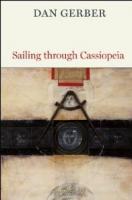
[Paperback] Copper Canyon Press, 110 pp., $16.00
Dan Gerber’s mastery of layered imagery and crystalline vision marry European Romanticism with American Zen. These meditative poems engage the natural landscape of California’s oak savannas and memories of childhood, while calling upon an array of literary progenitors—from Robinson Jeffers and Rainer Maria Rilke to the classics of the Chinese canon—exploring what it means to be linguistically alive in an animal world. As ForeWord magazine wrote, “Dan Gerber’s poems are quick, graceful, alert to their surroundings, and rarely wasting a motion.”
Recent Reviews
Review of The Dirt Riddles by Michael Walsh
by James Crews
In the glut of poetry books being published these days, it’s easy for collections like Michael Walsh’s The Dirt Riddles to get lost in the shuffle. Perhaps it’s also easy in our current literary climate for poets who choose to write accessibly about the natural world to fall by the wayside, for who can compete for the limelight if you don’t have a gimmick, aren’t published by one of the larger presses like Graywolf or Copper Canyon? The literary world seldom takes notice. Though I suspect that a poet like Walsh cares little for insular literary fame, his first collection—winner of the inaugural 2010 Miller Williams Arkansas Poetry Prize and the 2011 Thom Gunn Award for Poetry—should have garnered far more attention upon its publication. Read more at Basalt.
Christmas Gifts 2012: the Best Poetry Books
by Adam Newey
For his fans, the appearance of a new collection from the poet almost universally described as the English language’s greatest living practitioner of the art is an event. It’s also one that’s increasing in frequency as Geoffrey Hill, who turned 80 this year, steps up his rate of production. Odi Barbare (Clutag Press) is volume two in the Oxford professor of poetry’s projected five-part Daybooks series. It’s also, eccentrically enough, the third to appear, after volumes three and four respectively. Read more at the Guardian.
At Play in the Fields of Language: The Poetry of Cathy Park Hong (Part Two)

by John Yau
Engine Empire (2012) is divided into three discrete sections or, perhaps more accurately, three self-sustaining worlds, each with its own invented languages. In each section Hong utilizes radical forms and devices — a list, an abededarian, a lipogram — to propel her poems out of the lyric torpor so many other poets embrace. The language is volatile, undergoing metamorphosis and extreme pressure. Read more at Hyperallergic.
November 2012 Contemporary Poetry Reviews
by Seth Abramson
The windmill-tilting continues(!) — reviews of collections by Cara Benson, Donald Dunbar, Rachel Glaser, Paul Hoover, Michael Klein, and Stephen Kuusisto, plus strong words (per usual) on a number of topics relating to contemporary American poetry. Read more at the Huffington Post.
Correspondences
Chase Twichell Talks about Zen and Writing Poetry in the World as It Actually Is
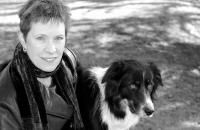
by Charlotte Pence
Chase Twichell applies her study of Buddhism to deliver well-chiseled, unsentimental poems that explore terrain not normally associated with Buddhist thought. Whether addressing hothouse irises, Dumpsters, or Chanel No. 5, her poems ponder questions that matter. For instance: What is the self, and why do we suffer? As a consequence, Twichell has been awarded many prestigious prizes, including the 2011 Kingsley and Kate Tufts Poetry Award, which carries a $100,000 stipend, and fellowships from the National Endowment for the Arts, the Artists Foundation, and the John Simon Guggenheim Memorial Foundation. Read more at Nashville Scene.
Poetry, Teaching and Technology With August Kleinzahler
by Ratik Asokan
August Kleinzahler is a distinguished American poet who is currently a visiting fellow at the Gould Center. This semester, Kleinzahler is teaching a six-week poetry seminar at CMC titled “Speed, Compression, Kablooey: Paris, New York and The New Poetries.” Kleinzahler has won numerous awards and fellowships. Allen Ginsberg has described him as a someone whose “verse line is always precise, concrete, intelligent, and rare. A loner, a genius.” Read more at the Forum.
Poet Searches Out Feminine Divine in Jewish Teachings
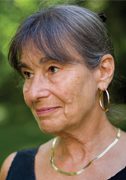
by Joan Gelfand
Becoming an award-winning writer of Jewish feminist poetry was not something Alicia Suskin Ostriker might have imagined growing up, a third-generation socialist raised in an atheist home in the 1940s and ’50s. “I was drawn to spiritual poetry, but I had no traditional Jewish training,” Ostriker, 75, said in an interview. “When I did read the Bible in my 20s, it was a revelation. I felt bonded to it. I felt, ‘These men and women are my mothers and fathers, and this God is my God.’ ” Read more at J Weekly.
Broadsides
Glut Reactions: The Demographics of American Poetry*
by Mike Chasar and Jed Rasula
“What happens when everyone is a poet?” asked Marjorie Perloff at the start of her controversial essay, “Poetry on the Brink.” Citing a recent lecture by renowned critic Jed Rasula, Perloff argued that “the sheer number of poets now plying their craft inevitably ensures moderation and safety.” In the following exchange, conducted via email between November 2011 and May 2012, Rasula and Mike Chasar, author of Everyday Reading: Poetry and Popular Culture in Modern America, take a closer look at the notion—so prevalent in discussions of contemporary poetry—that more Americans are writing poetry today than ever before. Read more at the Boston Review.
Philosophy and the Poetic Imagination
by Ernie Lepore and Matthew Stone
Perhaps now more than ever, we spend our days immersed in language. We communicate—talk, write and read—through a burgeoning array of forms and technologies. But most of us rarely stop to think about how language works, or how come we succeed in getting our ideas across in words. It all seems to happen naturally. Poets, novelists, speechwriters or the merely curious sometimes confront these questions, but it is a job that often falls to linguists and philosophers of language. Read more at the New York Times.
It Is in What the Poem Does: The Poetry of Ben Mazer
by Mario Murgia
Even though I made Ben Mazer’s acquaintance only recently (we met at a conference in Claremont this March), in reading his verse I experienced a familiarity that, at first, was difficult to acknowledge. Usually, it is difficult to remember what one thought of a poet upon a first reading of their work. That is, of course, unless you are facing a poet — a poem, even a single line perhaps? — that is truly memorable. When one reads Mazer’s verse for the first time, a very pedestrian thing becomes clear, a thing that determines the future of any individual in the world of business, for better or for worse: the relevance of a first impression. Read more at Critical Flame.
Drafts & Fragments
Envoi: Editor’s Notes
The Poem Is Everything Else except the Lines on the Page
by Brian Doyle
I have a friend who calls himself a poet because he published a poem in a magazine once, but then for fun he published the exact same poem in another magazine, just to see if he could, and ever since it’s been the deluge. By his count he has published the exact same poem in 11 little magazines and journals and reviews and webzines so far. He has published no other poem in his poetic career than that poem, which I have to say is a pretty good poem, although reading it 11 times, as I have, dilutes the salt and song of it a little — I know where the surprises are, the twists of phrase, the way he cracks his lines so they have a little extra pop and swerve in them. Read more at Oregon Live.
Although this is obviously disingenuous —or why not inform journals that you were seeking to re-publish the same poem?— it does bring up some interesting ideas. Surely there are many who can be accused of writing the same poem over and over again, if accused is indeed the right word. At some level, it happens subconsciously or even consciously. Think Monet’s Haystacks or poor John Fogerty who was sued for plagiarizing his own songs. So the idea of re-plowing the very same poetic ground does have a certain appeal, one whose challenge hangs between getting it right and making it new. There ought to be some variations (line breaks, word choices, title, etc.) even if the ideas, images, and telling is the same. Less has been claimed as poetry.
—David Sanders